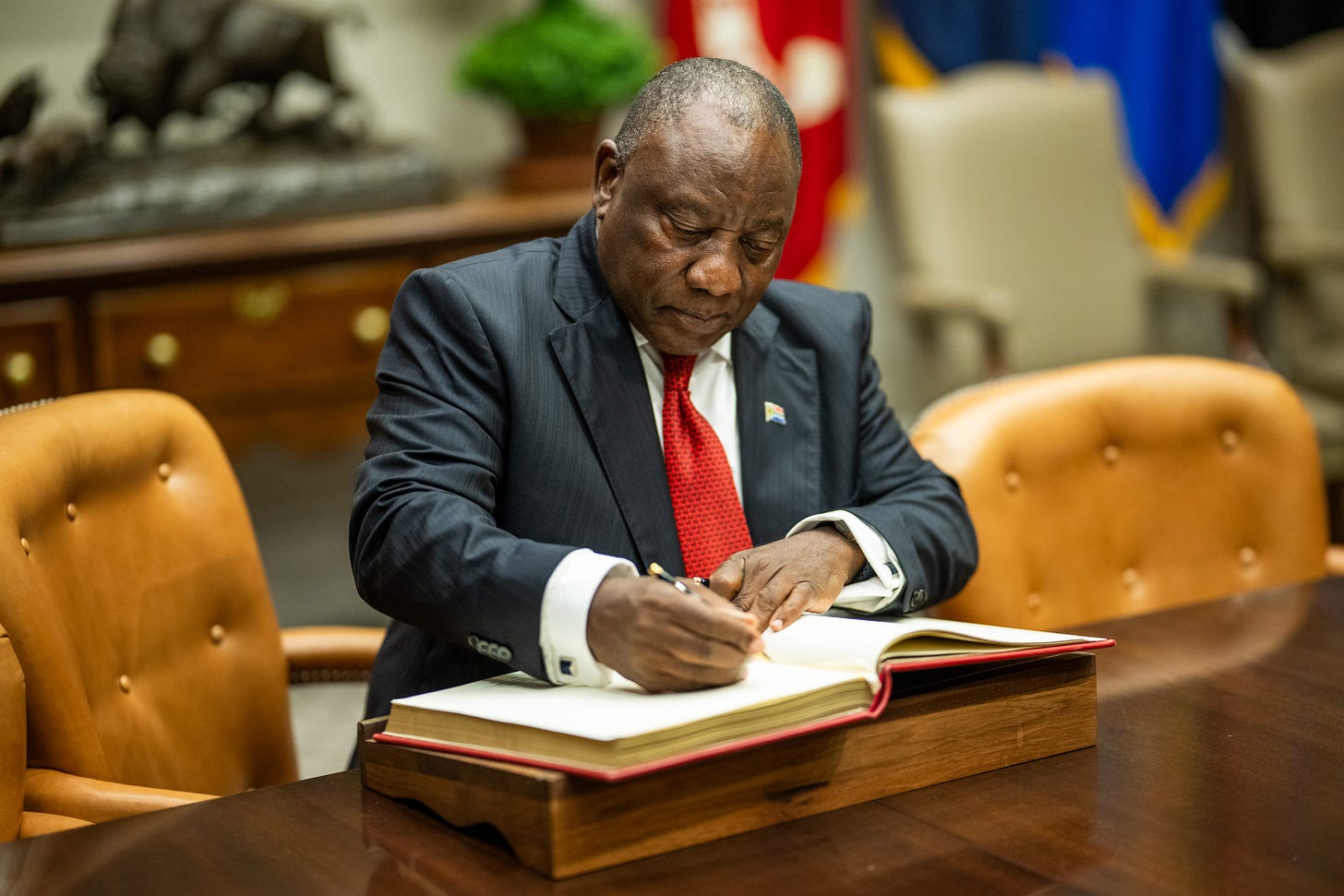On the South African Delegation
Ramaphosa could have selected better cabinet-level officials to meet with Trump

Yesterday, the President of South Africa, Cyril Ramaphosa, met with the President of the United States, Donald Trump, at the White House.
According to President Ramaphosa, the strategic objective of the meeting was to reset US-South Africa relations. It therefore merits consideration whether the South African delegation was fit for that purpose.
“We are essentially here to reset the relationship between the United States and South Africa.” - President Cyril Ramaphosa
As background, the South African delegation was composed of an unusual mixture of business leaders, professional golfers, and cabinet-level ministers. That included four cabinet-level ministers.
From a strategic management perspective, some of the ministerial choices were a good match for the stated purpose of the visit. For example:
Parks Tau is the Minister of Trade, Industry and Competition. Among other things, his portfolio includes responsibility for investment, trade, and enterprise development. A strong proponent of public-private partnerships, Tau was not only particularly well positioned to address concerns about Black Economic Empowerment expressed by the Trump Administration. He was the right person to try to make the case for new trade agreements between South Africa and the United States.
John Steenhuisen is the Minister of Agriculture. He is also the leader of the Democratic Alliance, the second-largest political party in South Africa. Given that his party has strong support in the Afrikaans community, Steenhuisen was not only particularly well positioned to address concerns about state-sponsored discrimination against white farmers that have been expressed by the Trump Administration. He was in a position to be able to explain the domestic political context in which those issues are embedded.
The others were not a perfect match:
Ronald Lamola is the Minister of International Relations and Cooperation. Among other things, his portfolio includes responsibility for the foreign policy of the Government of South Africa. Taken in isolation, that makes Lamola a very good match for the stated purpose of the visit. The problem is that his ministry recently expressed solidarity with the Government of Iran. That show of support undermines the maximum pressure campaign of the Trump Administration. It is therefore no wonder that the U.S. Secretary of State, Marco Rubio, did not attend the event.
Khumbudzo Ntshavheni is the Minister in the Presidency. Her portfolio includes responsibility for South African civilian intelligence agencies. Like Lamola, her role would have made her a very good match for the stated purpose of the visit. The problem is that Ntshavheni has been caught-up in domestic political controversies over the years. The most troublesome revolves around the Zondo Commission determination that she was “probably culpable” of enabling the state capture activities of the Guptas. Although she has strongly denied those allegations, Members of Congress trust the Zondo Commission.
There were cabinet-level ministers that would have been a better match but were not selected. Examples include:
Edward Mchunu is the Minister for Police. Among other things, his portfolio includes responsibility for the South African Police Service and the Private Security Industry Regulatory Authority. Whatever his position on US-South Africa relations, Mchunu would have been in a really good position to address the protection concerns for white farmers that have been expressed by the Trump Administration.
Angie Motshekga is the Minister for Defence and Military Veterans. Among other things, her portfolio includes responsibility for the South African National Defence Force. Whatever her position on US-South Africa relations, Motshekga would have been in the best position to address long-standing concerns about defense security cooperation between South Africa and U.S. adversaries (e.g., China; Iran; Russia). She also would have been the natural counterpart for one of the members of the U.S. delegation, U.S. Secretary of Defense Pete Hegseth.
One person who was conspicuously absent but would not have made a good match was the recently appointed South African Special Envoy to the United States. That is because Mcebisi Jonas remains embroiled in a controversy over his concurrent role as the Chair of the MTN Group, a South African company that is facing multiple lawsuits for allegedly aiding and abetting U.S. designated terrorist organizations. As a consequence, his participation would have risked creating an unnecessary distraction.
Did you find this blog post interesting? If so, then please consider becoming a member or making a donation to the author. Without your financial support, newsletters like this one cannot exist.



